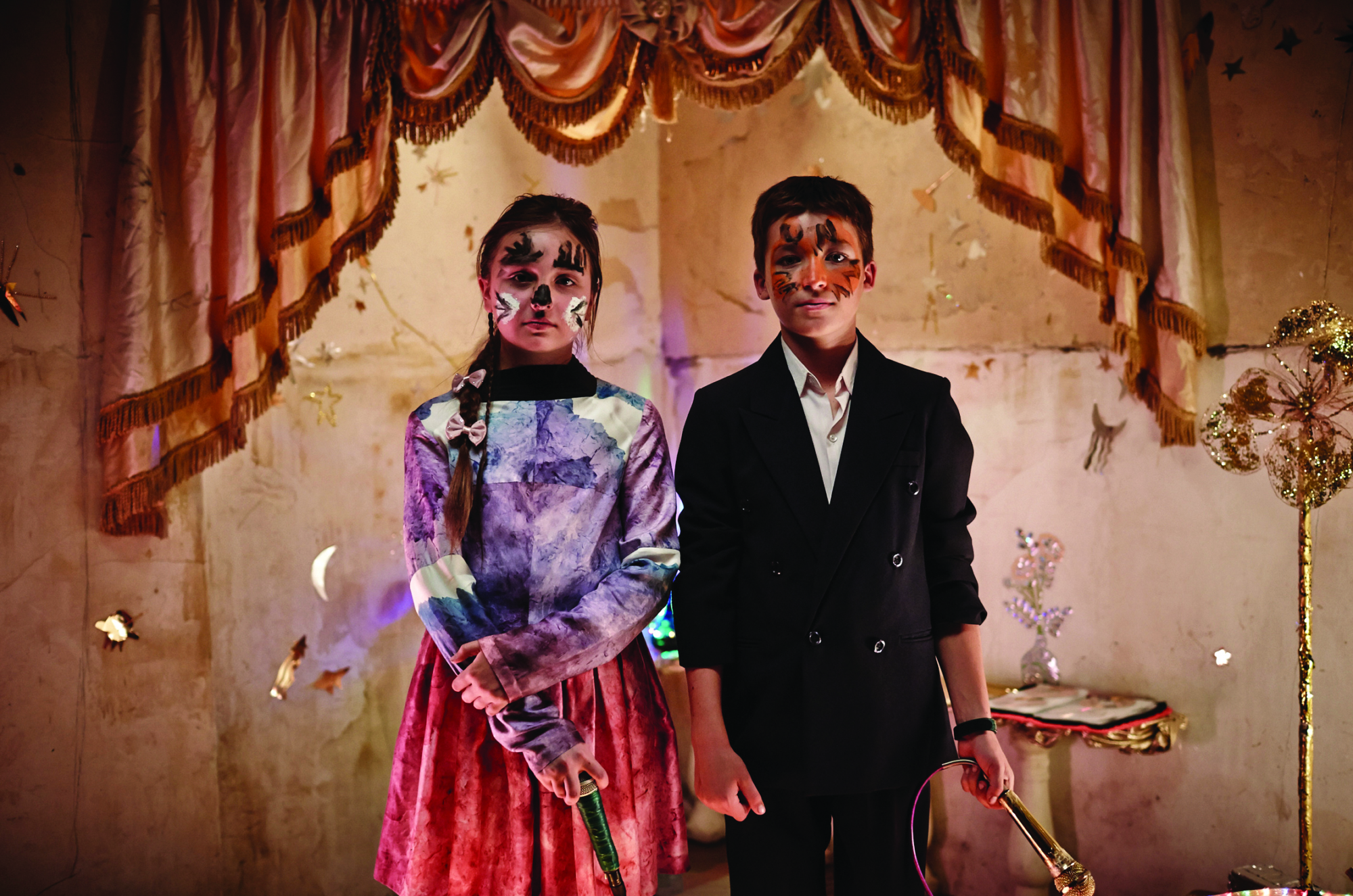The world of Partisan (Ariel Kleiman, 2015) is mythic chaos, a timeless twilight land geographically adrift, suspended in the eternal dialectic of knowledge. This human dilemma – the search for truth – is transposed into a classical tragedy that evokes ancient literature and scriptural tales, admixing disparate traditions and artefacts (including karaoke) to weave a tapestried film that is absurdly familiar and deeply relatable.
Itinerant, derelict and alone, the grizzled Gregori (Vincent Cassel) begins the story with a dream: to build a kingdom, a family, a home. He soon meets another injured creature, Susanna (Florence Mezzara), and her infant child, Alexander, whom he takes as his own. Eleven years later, Gregori has realised his dream. He presides as the patriarch of a secret Edenic community of children and their estranged mothers, living in apparent harmony, strictly removed from the unforgiving world. Within the security of his compound, Gregori has created a child’s paradise replete with games, food and celebration, and steeped in a warm, whispering magic. He protects and sustains his extended family with devotion, and they, in turn, deify him. He teaches them to be tough and to treat all things beyond his sovereignty with contempt. But his precepts, tragically, extend to violent ends. Gregori trains the children in paramilitary operations, running simulatory manoeuvres involving paintball guns and mock civilians; these playful exercises eventually translate to real-world assassinations that the children perpetrate on his behalf. The executions are performed with unwitting elan and rewarded like any other activity, with the children desensitised by Gregori’s rhetoric and, thus, incognisant of the moral weight of their actions.
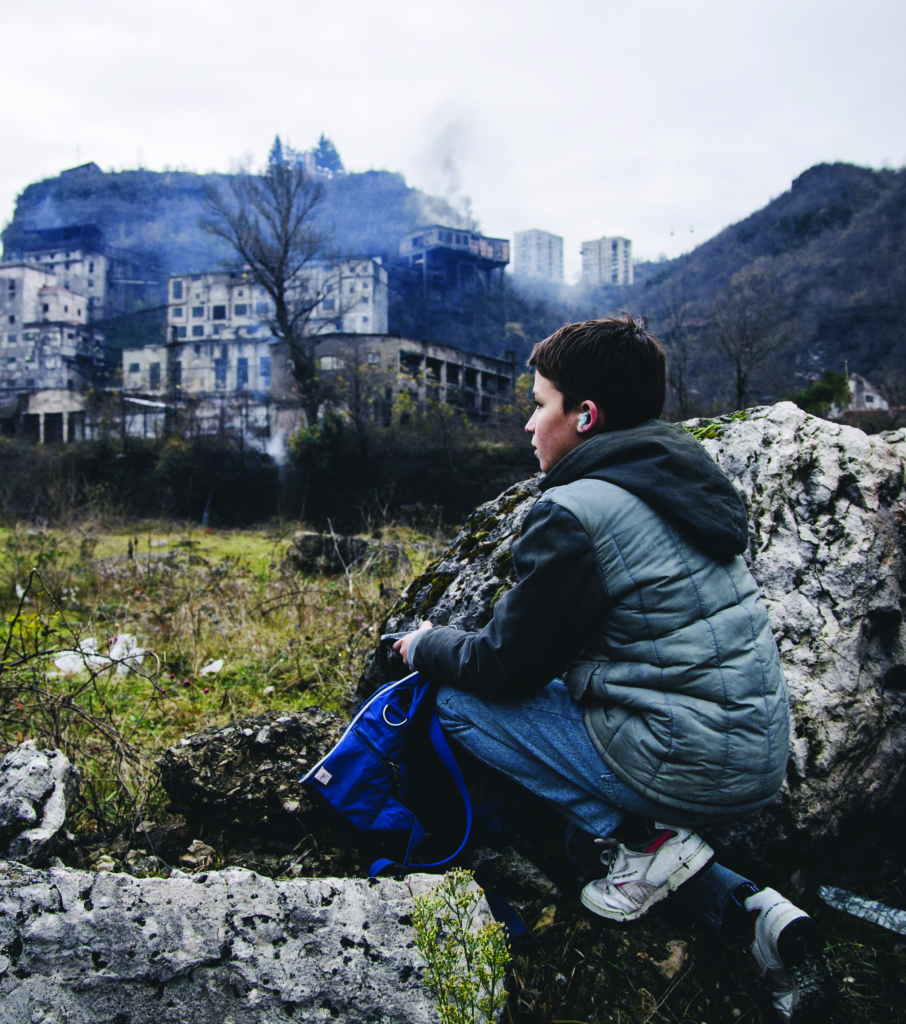
Alexander (Jeremy Chabriel), the eldest child and true heir to the ‘throne’, is Gregori’s greatest pride, demonstrating a flawless aptitude for academics and murder. But he is coming of age, and an incipient curiosity about life, morality and his father’s tenets stirs in him. As Alexander encounters the outside world, he is bemused to discover a kindness that he had believed extinct. A schism then forms between son and father as Alexander begins to deconstruct Gregori’s virulent myths about man.
‘To close yourself off from the world instantly means a loss of perspective. In this film, once that perspective is lost, all these kids are left with are their parents teaching them the world through their eyes – and these parents are incredibly damaged.’
Ariel Kleiman
The creator of this intimate yet sprawling narrative is Australian writer/director Ariel Kleiman, who collaborated on the script with Sarah Cyngler. Following the successes of his short films Young Love (2009) and Deeper than Yesterday (2010), Kleiman found inspiration for his first feature in a New York Times article on Colombian child assassins,[1]Ariel Kleiman, ‘Director’s Statement’, in Madman, Partisan press kit, 2015, p. 5 which reported on gangs that conscript young boys to murder for money, exploiting a legal loophole exempting minors from jail terms.[2]Eliza Griswold, ‘The 14-year-old Hit Man’, The New York Times, 28 April 2002, <http://www.nytimes.com/2002/04/28/magazine/28COLOMBIA.html>, accessed 4 May 2015. ‘That was the spark,’ Kleiman says.
There was a feeling there that seemed like very fertile ground, and that was our starting point. The feeling was a sense of tragedy that these young boys were not allowed to see the world through optimistic eyes, and I think that feeling is still at the core of the film.
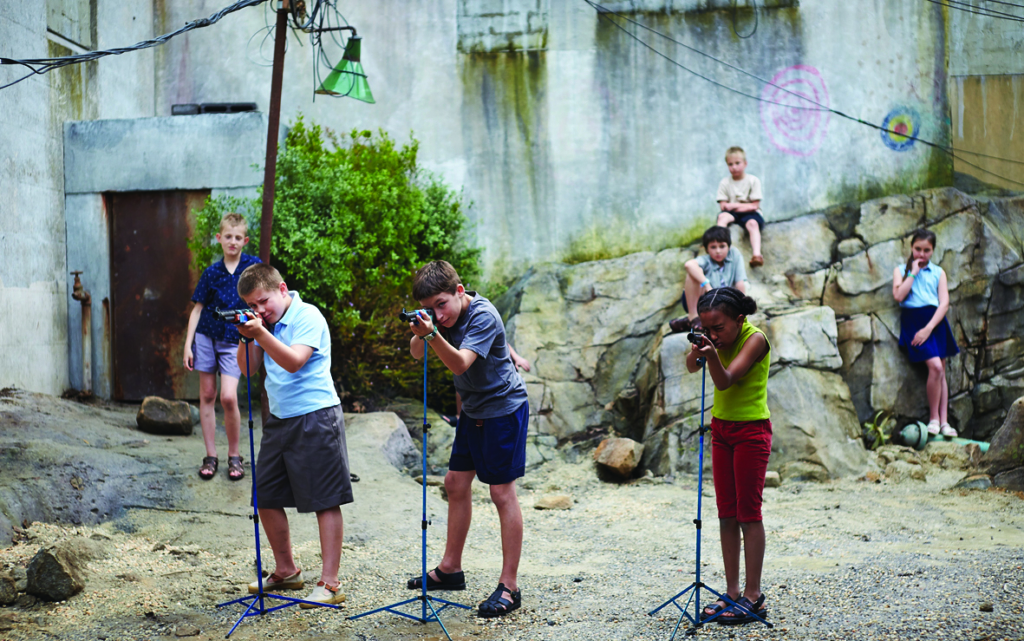
The next two-and-a-half years were spent writing the script. ‘Throughout the whole process, we were trying at every point to simplify and distil the story to its purest place. It became very specific to this boy and this man.’
Through its affective human narrative, Partisan presents a perpetual process at the heart of civilisation, capturing the continual death and renewal of models of understanding, and how ideologies – be they existential, social, political, moral – must revolt against one another for human consciousness to evolve. At the beginning of the film, Gregori’s micro-society is stable, and his subjects, receptive to his rule. He instructs the children to despise the people they murder and to worship him, and his dogmatic authoritarianism goes unquestioned. He tells Alexander:
It was our decision […] to do everything we could to prevent you from the ugliness of what the world had to offer. We felt that we could provide a better life for you kids than the one we had.
This systematic indoctrination has innumerable parallels within the barbarous history of humanity. Gregori conditions the children to develop a mindset that assigns utmost value to self-preservation, inculcates hatred and rejects opposition – a moral stance that has underpinned countless totalitarian regimes throughout the ages, incited religious and social persecution, and rationalised assassinations and genocides.[3]Mariana Momanu, ‘The Pedagogical Dimension of Indoctrination: Criticism of Indoctrination and the Constructivism in Education’, Meta: Research in Hermeneutics, Phenomenology, and Practical Philosophy, vol. 4, no. 1, June 2012, available at <http://www.metajournal.org//articles_pdf/88-105-mariana-momanu-meta7-tehno.pdf>, accessed 4 May 2015, pp. 92–3. ‘A partisan is a devout follower, and that’s what we were interested in exploring,’ says Kleiman. ‘Up to a certain age, kids are the most devout followers.’
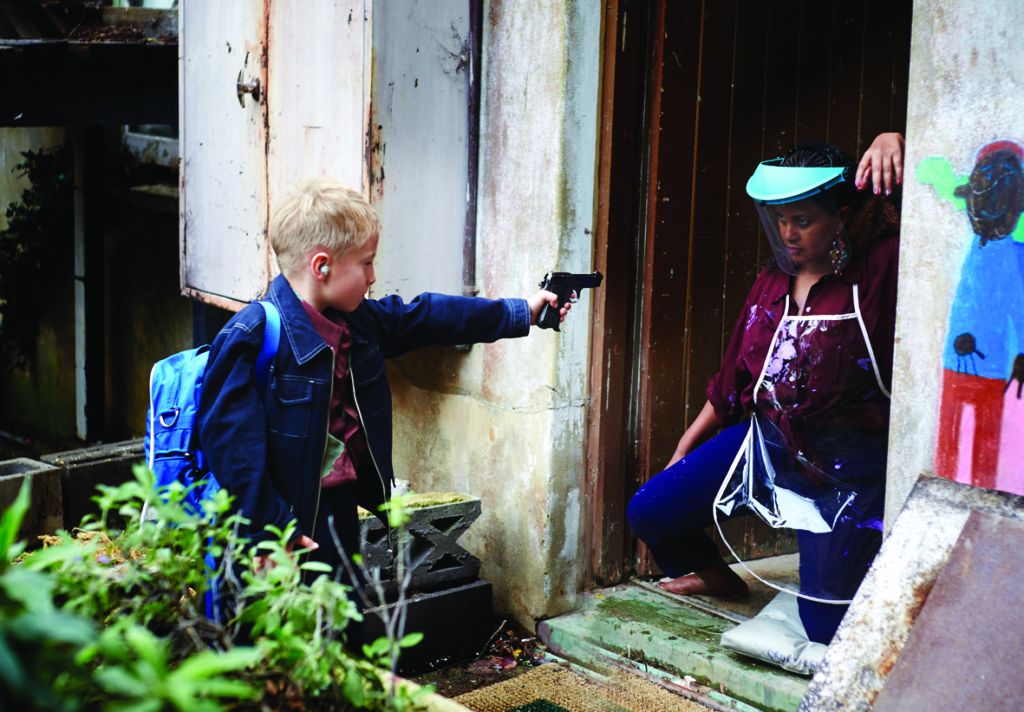
In ‘The Pedagogical Dimension of Indoctrination’, Mariana Momanu argues that the consolidation of any totalitarian system is heavily reliant on the indoctrination of the youth.[4]ibid., p. 89. Children – in reality and in Partisan – represent the impressionable extreme, the susceptible inheritors of a fundamentally skewed logic. Gregori’s pseudo-reality encourages the children to dissociate from objective reality and adopt a perspective whereby, in the words of Czech philosopher and dissident Václav Havel, ‘the significance of phenomena no longer derives from the phenomena themselves, but from their locus as concepts in the ideological context’.[5]Václav Havel, ‘The Power of the Powerless’, in Open Letters: Selected Writings 1965–1990, trans. Paul Wilson, Vintage, New York, 1992, available at <http://vaclavhavel.cz/showtrans.php?cat=eseje&val=2_aj_eseje.html&typ=HTML>, accessed 20 March 2015. Thus, a specious belief can acquire concrete legitimacy – in this case, convincing a child to kill unblinkingly. As Kleiman expresses:
To close yourself off from the world instantly means a loss of perspective. In this film, once that perspective is lost, all these kids are left with are their parents teaching them the world through their eyes – and these parents are incredibly damaged. The fact that their hatred towards humanity is being passed down in a closed environment is, in my eyes, the definition of a horror.
Yet, here, this abhorrent systematic manipulation acquires a surprisingly sympathetic, and ultimately more interesting, aspect. Kleiman complicates the notion of indoctrination by interweaving it with a behaviour that has an evolutionary basis: that of raising a child. Partisan highlights how Gregori’s ostensibly reproachable behaviour is grounded in a common protective instinct and his desire to fill an emotional void. ‘We wrote Gregori from a place of love,’ Kleiman explains.
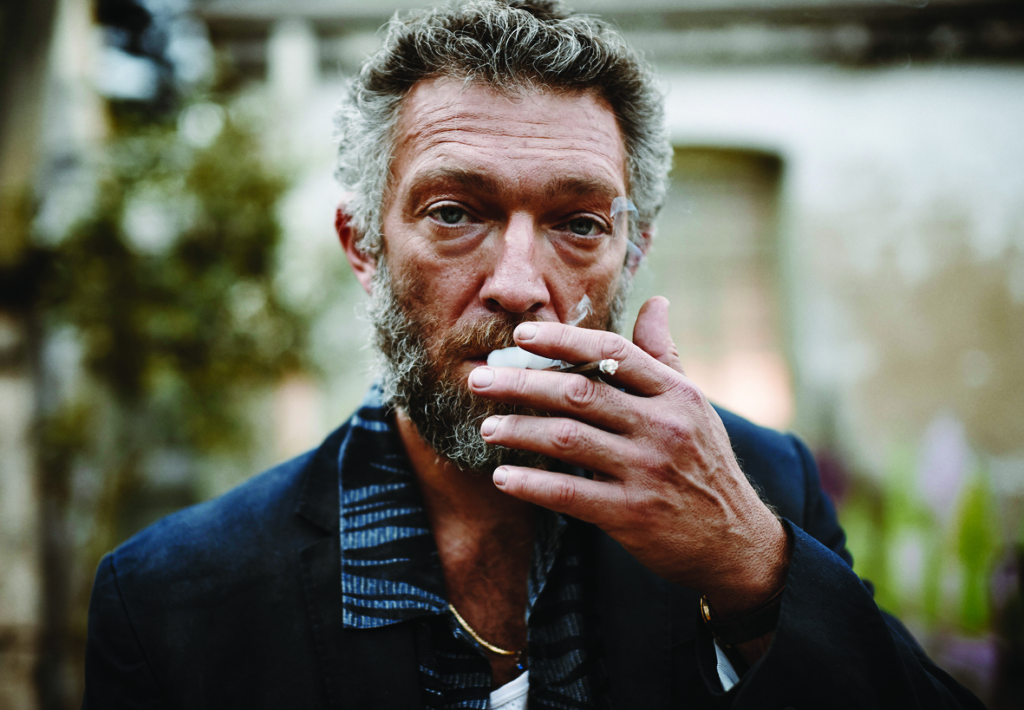
We felt a lot of his impulses were very paternal and very truthful […] It was important for us to show him in the beginning as this lonely, angry figure with a dream. What we show in the beginning is him building a family table, so his dream wasn’t sprouted from violence – it was actually the idea of a big family.
Beneath his possessiveness, sophistry and puritanical brainwashing, Gregori encapsulates parents’ selfless devotion to their offspring, as well as the instinct to safeguard their young by instilling in them a life-preserving worldview. Kleiman continues:
One of the biggest impulses of a parent is to protect their kids, and Gregori is creating the ultimate protection for them. He believes that closing them off to all the negative experiences he had outside in the world [is] the best thing for them.
This impulse inspires Gregori to make concrete an illusory state of constancy, contriving a world where access to external information is restricted, and truth and power are centralised. Whether as the parent, the dictator or the god, Gregori personifies the insular end of the knowledge continuum, which thwarts progress and rejects pluralism, and instead upholds stagnation under the guise of monistic tradition.
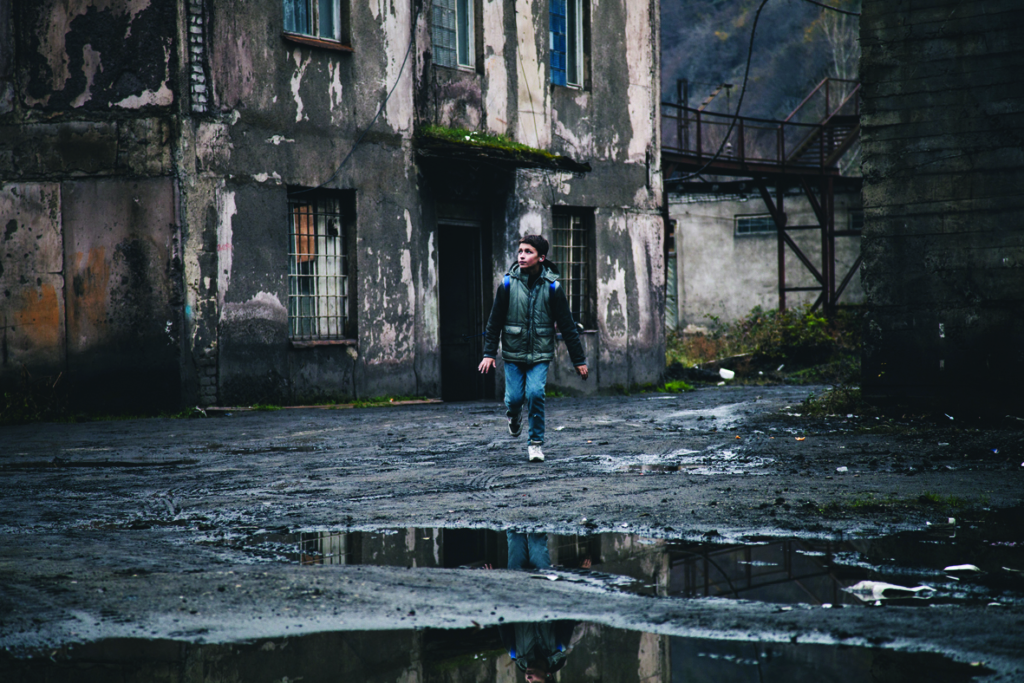
If Gregori evokes the old, the archaic and the broken, Alexander embodies the new, the progressive and the optimistic. Through a series of encounters with alternative ideas, an individualistic streak emerges in him – and this catalyses a process of enlightenment and, subsequently, a deposition of his father’s oppressing rule. The first of these revelatory encounters is enabled by Alexander’s increasing contact with the world beyond the commune. On his contracted excursions outside the compound, he is at first defensive and suspicious, and eliminates his targets without compunction. But slowly, as he pauses and observes, he sees the face of humanity, not snarling at him, but poised in a neutral expression – perhaps even smiling. ‘When we get outside, we experience the outside world through Alexander’s perspective,’ Kleiman says. ‘It feels like a brutal place but, once he starts to connect with people, he notices another side to the humans out there.’ A shopkeeper gifts Alexander with a bar of chocolate; a boy examines his gun, then returns it. Through an unbiased lens, the world becomes divested of its apparent malice, and Alexander soon finds himself flouting Gregori’s strict edicts of detachment and hostility, and embracing life anew.
Alexander realises that the enemies his father has trained him to attack are figments – fabricated opponents designed to fuel the commune’s ideology – and comes to terms with the horror of his own actions and the dangerous corruption of Gregori’s heart.
Alexander’s internal struggle is reflected by the exterior environment in which the narrative unfolds. The landscape of Georgia stands in for Partisan’s terra incognita, with Kleiman recounting that when they ‘travelled to Georgia as tourists in 2010’, they ‘not only fell in love with the country, but instantly saw this as the world of the film’. From afar, Alexander looks upon the bleak and desolate world mythologised by his father; it is filled with the crumbling vestiges of civilisation: ravaged Eastern Bloc infrastructure encircled by shadowy wilderness unknowns. But, on closer inspection, he discovers a different nature – peaceable denizens who engage him sociably and seem perplexed by his unease. This bridging of physical space mirrors the boy’s cognitive leaps.
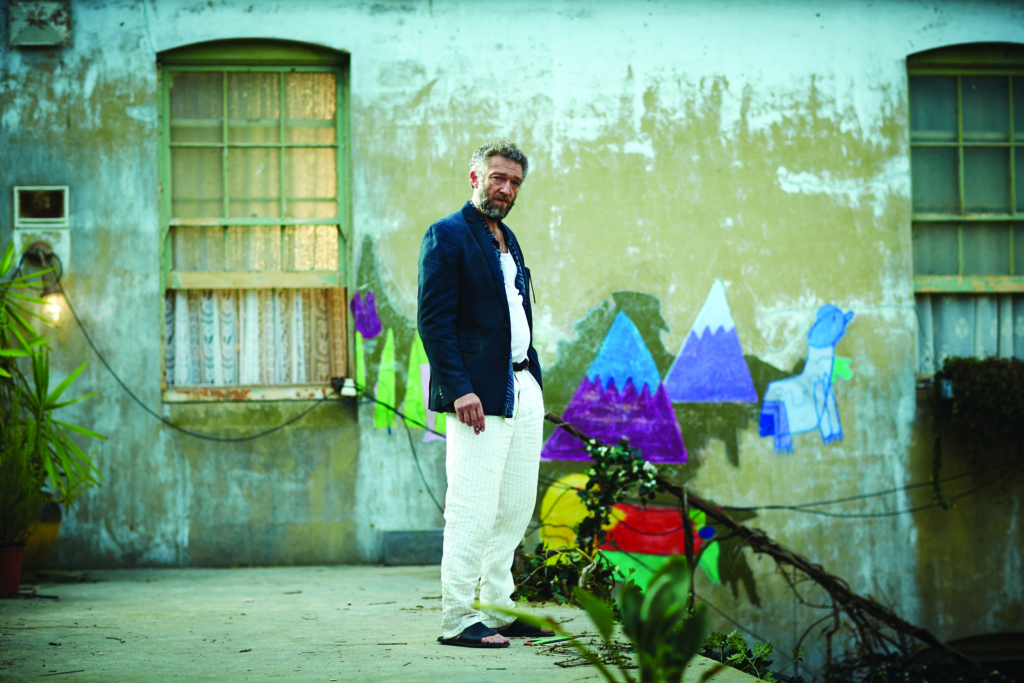
The second crucial motivation for Alexander’s reformation is the arrival of Rosa (Rosa Voto) and her eleven-year-old son, Leo (Alex Balaganskiy) – more of humanity’s ‘victims’ whom Gregori has ‘rescued’ – from a neighbouring hospital. Yet to be socialised into the commune’s ideology, Leo disturbs the existing power structure, habitually contradicting Gregori’s lessons and asserting an alternative mentality. The newcomer’s critical spirit culminates in an act of altruism when he thwarts the killing of chickens for food by guarding their coop and threatening violence. Despite Gregori ordering him to desist – to conform – he holds fast, propounding a concept alien within the compound: the sanctity of all life. Inevitably, Gregori eliminates the boy – embodying the totalitarian necessity to suppress dissent – but Leo’s reactionary verve has already taken root.
As Alexander’s beliefs are challenged and the fallibility of his father’s worldview is exposed, cognitive dissonance ensues. These events crystallise his nascent self-will, propelling him away from collectivism, and towards individualism and revolt. Upon the birth of his baby brother, Tobias, the density of human life has been fully restored to him. Alexander realises that the enemies his father has trained him to attack are figments – fabricated opponents designed to fuel the commune’s ideology – and comes to terms with the horror of his own actions and the dangerous corruption of Gregori’s heart. This process of cognitive conflict and the subsequent reformulation of knowledge underlies a crucial component in the progress of both the individual and the species.[6]Momanu, op. cit., pp. 100–1. But this process is one historically suppressed and prone to bloodshed. So it is in Partisan, in which Alexander, in an absurd circular refusal and demonstration of what Gregori has taught him – to wield a gun, to hit a man before he hits you – saves his brother and overthrows his father.
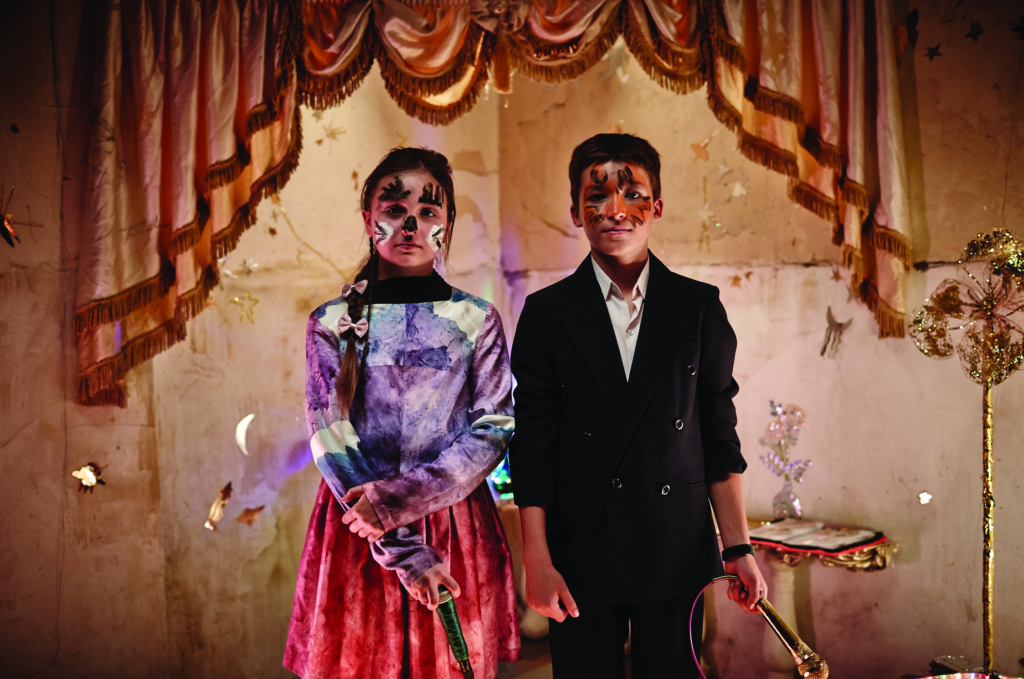
At the crucial moment – gun levelled, Tobias clutched – Gregori rebukes Alexander: ‘You might think you know about life, about what’s good and what’s bad. But you don’t. You’re just a child, just a little child.’ Through this statement, Gregori evokes the instability of the belief that age correlates with wisdom – and, throughout its narrative, Partisan suggestively dissolves the line between child and adult. In part, Gregori remains in a state of suspended adolescence. Although murky, his past murmurs of abandonment and heartbreak, with his present communal life – where everything is provided for and everyone is loved – seemingly a means to vicariously repair his stunted childhood and correct a deep inner imbalance. When he interacts with the children, he at times becomes them – both through raw spirit and volatile impetuosity. On one occasion, he is shown lulled to sleep by one of the mothers, seeking the tenderness that the film implies had been absent in his formative years. Alexander, on the other hand, develops a distinct intelligence throughout the film, forming a cogent system of reasoning and displaying a maturity beyond his years. Yet, instead of depicting a facile demarcation, Partisan presents the course of human development – from boy to man, savage to civilised – as being specific to individual circumstances. Age does not necessarily denote wisdom; it is the quality of the individual’s thought, not the length of its application, that is significant.
As Immanuel Kant has written, to ascend towards moral and intellectual enlightenment, each age must allow the succeeding one to reappraise and expand its knowledge.[7]Immanuel Kant, ‘An Answer to the Question: What is Enlightenment?’, [1798], available at Marxists Internet Archive, <https://www.marxists.org/reference/subject/ethics/kant/enlightenment.htm>, accessed 4 May 2015. Partisan addresses how the dynamics of ideological conflict and the overthrowing of obsolete paradigms parallel the processes of epistemological transformation that permeate the life of the individual. The strength of the film rests in its preference for the implicit, which allows such lofty themes as knowledge and enlightenment to be embedded within a resonating tale of parental instinct and adolescent resistance. According to Kleiman, ‘While writing [Partisan], we pictured the film’s structure as if we were this documentary crew capturing moments within a year of this boy’s life.’ Indeed, past and present glimmer with incertitude, intentions and feelings retain a fickle latency, and the physical world is imbued with a haunting, entrancing mystery. This predilection for the suggestive and the fragmentary – the mixing of the ordinary and the impressionistic – is integral to the film’s unique oneiric quality, and seems to underpin Kleiman’s overall approach to the medium.
I love movies that throw me into this world where I’m slowly trying to piece together what’s going on […] I feel like so many movies spoonfeed me to the point of nausea, so there’s a part of this movie that’s rebelling against that.
This subversion is likewise evident in Partisan’s own exploration of truth and how forms of knowledge clash and coexist within a social structure.
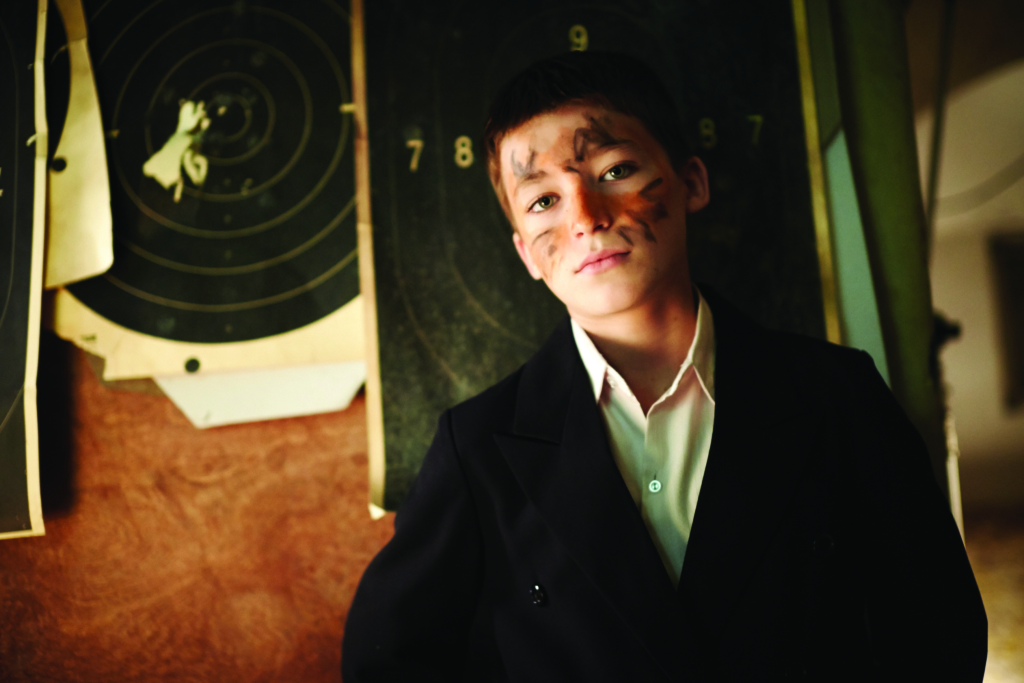
At the beginning of 2015, Kleiman brought Partisan to the US, where it premiered at the Sundance Film Festival – a spiritual cinematic home for him. In 2011, he received the Jury Prize for International Short Filmmaking for Deeper than Yesterday, and in 2012 was invited to develop Partisan under the auspices of the Sundance Screenwriters Lab. This year, Partisan was nominated for the World Cinema Dramatic Grand Jury Prize, and was awarded the Special Jury Award for Cinematography. Kleiman describes the experience of returning to Sundance as ‘overwhelmingly positive’: ‘We were really not sure how audiences would react to the movie. And I was really pleased to see how much people connected to Alexander.’
Indeed, it is through this young boy that Partisan delivers its lyrical rendering of protection, rebellion, and the replacement of obstinate hostility with optimistic renewal. Alexander is revolting against Gregori’s demonisation of the external world, and learning to perceive the true complexity of existence and moral responsibility. By weaving a tragedian tale that evokes universal themes, detached from time and place, Partisan elevates itself to the realm of fable, inviting the audience to explore the eternal conflict and transformation of human thought and spirit.
http://www.partisanfilm.com.au
Endnotes
| 1 | Ariel Kleiman, ‘Director’s Statement’, in Madman, Partisan press kit, 2015, p. 5 |
|---|---|
| 2 | Eliza Griswold, ‘The 14-year-old Hit Man’, The New York Times, 28 April 2002, <http://www.nytimes.com/2002/04/28/magazine/28COLOMBIA.html>, accessed 4 May 2015. |
| 3 | Mariana Momanu, ‘The Pedagogical Dimension of Indoctrination: Criticism of Indoctrination and the Constructivism in Education’, Meta: Research in Hermeneutics, Phenomenology, and Practical Philosophy, vol. 4, no. 1, June 2012, available at <http://www.metajournal.org//articles_pdf/88-105-mariana-momanu-meta7-tehno.pdf>, accessed 4 May 2015, pp. 92–3. |
| 4 | ibid., p. 89. |
| 5 | Václav Havel, ‘The Power of the Powerless’, in Open Letters: Selected Writings 1965–1990, trans. Paul Wilson, Vintage, New York, 1992, available at <http://vaclavhavel.cz/showtrans.php?cat=eseje&val=2_aj_eseje.html&typ=HTML>, accessed 20 March 2015. |
| 6 | Momanu, op. cit., pp. 100–1. |
| 7 | Immanuel Kant, ‘An Answer to the Question: What is Enlightenment?’, [1798], available at Marxists Internet Archive, <https://www.marxists.org/reference/subject/ethics/kant/enlightenment.htm>, accessed 4 May 2015. |
